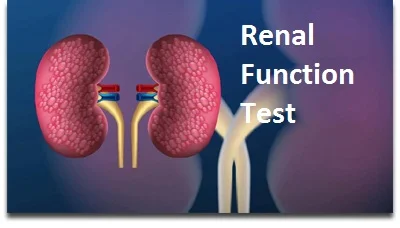Renal Function Test
Table of Contents
Introduction
- The kidney (renal) function can be assessed through a series of tests known as renal function tests (RFT). In order to ascertain the kidneys’ current state of health, the tests measure blood levels of a variety of substances, including proteins, several minerals, electrolytes, and glucose (sugar).
- Waste products can build up in the blood and fluid levels can rise to dangerous levels if the kidneys aren’t working right, causing damage to the body or a potentially fatal situation. Damage to the kidneys can be caused by a variety of conditions and diseases. Diabetes and hypertension are the main risk factors for kidney disease and the most common causes.
Indication
- Assessment of renal function can be done for a variety of reasons, including acute emergencies and long-term conditions.
- The primary purpose of renal function tests is to identify the renal disease, decide on the best course of treatment for the patient, and stop further decline in renal function.
- In patients whose renal disease has been identified, additional indications include monitoring the progression of renal disease to ensure that optimal management occurs and to monitor intervention response.
- Components of RFT In clinical practice, the most useful tests for evaluating renal function are those that look for proteinuria (albuminuria) and estimate the glomerular filtration rate (GFR).
Glomerular Function- Clearance Test
- The kidneys contain about one million tiny nephrons, which filter blood. Each nephron’s blood is continuously filtered through a glomerulus, a group of looping blood vessels that let water and small molecules through but keep blood cells, proteins like albumin, and larger molecules inside.
Glomerular filtration rate (GFR), which measures the rate in milliliters per minute at which plasma substances are filtered through the glomerulus, is the best test for evaluating glomerular function. that is the process of removing a substance from the blood. Adult males typically have a GFR between 90 and 120 mL per minute.
Doctors use a formula to estimate GFR or eGFR because testing for GFR can be difficult and time-consuming. The standard method for assessing GFR is with a straightforward blood test that actions creatinine levels. Creatinine is a byproduct of the normal breakdown of muscle tissue and the digestion of dietary protein. Creatinine levels can be influenced by diet, muscle mass, malnutrition, and other chronic illnesses in addition to kidney disease. - The stages of chronic kidney disease (CKD) are outlined in the Kidney Disease Improving Global Outcomes (KDIGO) report:
- GFR greater than 90 ml/min/1.73 m2 is the first stage.
- GFR between 60 and 89 ml/min/1.73 m2 is the second stage.
- GFR between 45 and 59 ml/min/1.73 m2 is the third stage.
- GFR between 30 and 44 ml/min/1.73 m2 is the fourth stage.
- GFR between 15 and 29 ml/min/1.73 m2 is the fifth stage (end).
Albuminuria
- Because it indicates increased endothelial permeability, it is an independent cardiovascular disease marker and a chronic renal impairment marker.
- As an albumin/creatinine ratio, urine albumin can be measured in 24-hour collections or in the early morning, or in random specimens.
- Gliomular dysfunction is indicated by the presence of albuminuria on two separate occasions without the presence of a urinary tract infection. Chronic kidney disease is evident when albuminuria persists for at least three months.
Typical Tests
- The individual tests that are part of a kidney function panel can vary from laboratory to laboratory, but the following are the most common ones:
Electrolytes
- Electrically charged synthetic compounds that are imperative to ordinary body processes, for example, nerve and muscle capability; contribute to the body’s fluid balance and acid-base equilibrium, among other things. Electrolytes consist of:
- Bicarbonate of soda and sodium chloride (total CO2).
Minerals
- Phosphorus is a mineral that is necessary for the production of energy, the function of muscles and nerves, and the growth of bones; It also helps to maintain the body’s acid-base equilibrium by acting as a buffer.
- Calcium is one of the body’s most important minerals; It is necessary for blood clotting and bone formation, as well as for the proper functioning of the heart, muscles, and nerves.
Protein
- Albumin is a protein that keeps fluid from leaking out of blood vessels and transports hormones, vitamins, drugs, and ions like calcium throughout the body. It makes up about 60% of the protein in the blood.
Urea
- This is a waste product that comes from the metabolism of protein and contains nitrogen. it is delivered by the liver into the blood and is conveyed to the kidneys, where it is sifted through the blood and wiped out in the pee.
- Creatinine is a waste product produced by the muscles of the body; The kidneys eliminate nearly all creatinine.
Source of Energy
- Glucose provides the body with energy; A steady supply must be available for use, and the blood glucose level must remain relatively constant.
- Creatinine’s Clinical Importance: When the glomerular filtration rate decreases significantly or obstruction of urine elimination occurs, serum creatinine rises. Before a rise in serum creatinine can be detected, approximately fifty percent of kidney function must be lost. As a result, serum creatinine is a late indicator of severe kidney damage.
- BUN: In both acute and chronic renal disease, the serum urea/BUN level rises.
- The presence of renal disease, the stage of CKD, and treatment response are all assessed using eGFR equations.
FAQs
Normal Results Men’s normal results range from 0.7 to 1.3 mg/dL (61.9 to 114.9 mol/L) and women’s normal results range from 0.6 to 1.1 mg/dL (53 to 97.2 mol/L). Creatinine levels tend to be lower in women than in men. This is on the grounds that ladies frequently have less bulk than men. The amount of muscle mass and size of a person affect their creatinine level.
What elements of a renal function test are included? a look at your serum creatinine and blood urea nitrogen (BUN) levels. An expanded degree of BUN and creatinine shows kidney issues. Test for albumin.
The Kidney Function Test, also known as the Renal Function Test, the RFT Test, or the KFT/RFT Test, is a set of biochemistry blood tests that can be used to evaluate a person’s renal function. Renal Function Test, RFT Test, Kidney Profile, and Kidney Panel are other names for the KFT test.
Obtaining an estimate of the glomerular filtration rate (GFR) and determining whether proteinuria (albuminuria) is present are the clinically most useful tests for evaluating renal function. The glomerular filtration rate (GFR) is the best overall indicator of glomerular function.
What exactly is renal impairment? Poor kidney function is known as renal insufficiency, and it may be brought on by a decrease in the amount of blood that reaches the kidneys as a result of renal artery disease. The kidneys are normally in charge of controlling blood pressure and fluid levels, chemistry in the blood, and the removal of organic waste.
The liver’s overall health is evaluated by these tests. On a single blood sample, the various substances are frequently tested simultaneously, and they may include the following: The protein albumin is produced in the liver.








One Comment